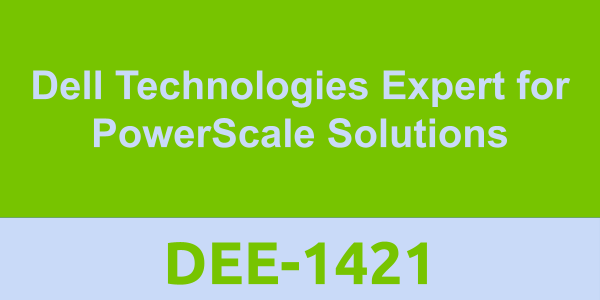This exam is a qualifying exam for the Expert - PowerScale Solutions (DCE) track. This exam has two parts, a passing score is required on both parts.
• Part 1 consists of knowledge and experience-based questions
• Part 2 consists of performance-based simulations
The focus of this exam is on advanced environments and workflows where a PowerScale scale-out NAS platform can be applied. Advanced networking configurations, systems integrations, security and data protection protocols are all examined as components of an appropriate PowerScale solution. Students are expected to have a deep understanding of not only course material, but of documented best practices and administration guides as well as field experience working with the PowerScale product.
The focus of this exam is on advanced environments and workflows where a PowerScale scale-out NAS platform can be applied. Advanced networking configurations, systems integrations, security and data protection protocols are all examined as components of an appropriate PowerScale solution. Students are expected to have a deep understanding of not only course material, but of documented best practices and administration guides as well as field experience working with the PowerScale product.
Dell Technologies provides free practice tests to assess your knowledge in preparation for the exam. Practice tests allow you to become familiar with the topics and question types you will find on the proctored exam. Your results on a practice test offer one indication of how prepared you are for the proctored exam and can highlight topics on which you need to study and train further. A passing score on the practice test does not guarantee a passing score on the certification exam.
Dell Technologies PowerScale Solutions Expert Exam Summary:
| Exam Name | Dell Technologies Certified Expert - PowerScale Solutions (DCE) |
| Exam Code | DEE-1421 |
| Exam Price | $230 (USD) |
| Duration | 120 mins |
| Number of Questions | 60 |
| Passing Score | 60% |
| Books / Training | Expert - PowerScale Solutions Training |
| Sample Questions | Dell Technologies PowerScale Solutions Expert Sample Questions |
| Practice Exam | Dell Technologies DEE-1421 Certification Practice Exam |
Dell Technologies DEE-1421 Exam Syllabus Topics:
| Topic | Details | Weights |
| Concepts | - Describe Disaster Recovery (DR), DR plans, and disaster resilience - Describe the OneFS domains, system management troubleshooting tools, and methodologies - Describe the Job Engine architecture, job types, priorities, impact, and Job Engine management |
13% |
| Advanced Access | - Discuss the networking architecture, including access zones, LACP, VLAN, network routing (Static and SBR) - Design multi-tenancy solutions, including implementing groupnets, access zones, networks, DNS, authenticators, and applying namespaces - Assess supported authentication providers and methods, including variants of Kerberos (such as AD RFC-2307, NIS, User and ID mapping, and LDAP plus share and directory), Local and File Provider, and MFA - Configure data access protocols, including NFSv3, NFSv4, SMB3, S3, HTTP, FTP, advanced settings, and protocol security |
22% |
| Advanced Authorization and OneFS Reporting | - Manage multiprotocol permissions and user identity mapping - Configure OneFS features for system monitoring, including alerts, events, syslog, SNMP, CEE, and related isi commands - Design and analyze reporting mechanisms, including notifications, SMTP, log files, and protocol auditing |
15% |
| OneFS Storage Efficiency and Services | - Design and implement SmartQuotas - Design and implement SnapshotIQ - Discuss Small File Storage Efficiency (SFSE) and Antivirus integration provided by OneFS - Plan and implement data migrations, including migration methodologies and permissions - Describe SyncIQ architecture, policies, jobs, and management |
20% |
| Disaster Recovery Solutions | - Design data recovery solutions, including SyncIQ and Deep Copy, Snapshots, failover and failback, and third-party applications (for example, Superna) - Implement NDMP - Implement Cloud and Virtual Strategies, including CloudPools, and their integration with other cloud platforms (for example, ECS) |
17% |
| Performance and Monitoring | - Analyze workflow impact to define and implement data access acceleration (non sequential data flow, streaming media, file system protection settings, and configuration design) - Describe how to use cluster performance analysis tools, including DataIQ, InsightIQ, and HealthCheck - Analyze the root cause of performance issues and evaluate cluster performance metrics, including peformance benchmarks |
13% |





0 comments:
Post a Comment